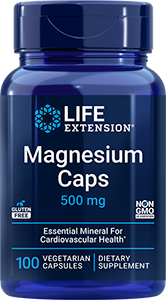
Newsletter
Newsletter
Study finds supplementation with antioxidant vitamins improved older individuals’ immune function

December 1, 2020
The December 2020 issue of Experimental Gerontology published the finding of a recent study that found immune benefits for supplementation with vitamins C and E in older individuals.
“It has been shown that the competence of the immune system is an excellent marker of health and several age-related changes in immune functions have been linked to longevity,” Monica De La Fuente of Complutense University of Madrid and colleagues wrote in their introduction to the article. They suggested that values for specific immune functions could be used as individualized markers of biological age.
The study included 22 older men and women who received 500 milligrams (mg) per day of vitamin C and 22 participants in the same age group who received 500 mg of vitamin C plus 200 mg of vitamin E for three months. Thirty unsupplemented men and women whose age averaged 35 years served as controls. Functional aspects of two types of white blood cells known as neutrophils and lymphocytes were assessed at the beginning of the supplementation period, at three months, and six months following the end of supplementation.
At three months, neutrophil values known as adherence indexes, chemotaxis indexes and phagocytosis indexes improved in supplemented individuals and more closely resembled those of the younger control group. Superoxide anion (a free radical) levels in neutrophils decreased in both supplemented groups and, in some cases, became even lower than those of the control subjects. Supplementing with both vitamins was associated with lower superoxide levels than with vitamin C alone. Superoxide levels measured six months after the end of the treatment period were still lower than those measured before supplementation in both supplemented groups.
When lymphocyte functions were evaluated, adherence index and chemotaxis values were improved in association with vitamin supplementation compared to pretreatment levels. Lymphoproliferative capacity, interleukin-2 release and natural killer cell activity, which were lower in the older subjects than in the control group, increased after supplementation to levels similar to those of the control group.
Dr. De La Fuente and her associates suggest that the benefits observed in this study in association with vitamin C and E supplementation may be due to their antioxidant and anti-inflammatory roles, although other factors may be involved. “An important number of studies show that the ingestion of diets with adequate levels of antioxidants such as vitamins E and C, beta-carotene, polyphenols and others, are able to retard or prevent the oxidative damage and therefore the general physiological impairment associated with aging, and in particular immunosenescence,” they wrote.
“It is possible to suggest that the supplementation used in the present study could improve the quality of life and extend a healthy longevity in elderly men and women,” they concluded.
Products
Apply What You’ve Learned: Immunosenescence
- Immunosenescence describes a decline in immune function that takes place during aging. This decline helps explain an increased risk of infections as well as their more debilitating effects among older men and women.
- Vitamin C has antioxidant, immunostimulatory, antinflammatory, antibacterial and antiviral roles, all of which support healthy immune function.1 Vitamin C regenerates vitamin E, thereby perpetuating its antioxidant effect.2
- Animal and human findings indicate that vitamin E may help reverse aging-associated T cell (a type of lymphocyte) impairment.3
- In a U.S. study that utilized data from the National Health and Nutrition Examination Survey (NHANES) 2003-2006, 52% of adults were found to consume less than the Estimated Average Requirement of vitamin C from naturally occurring sources (not from fortified foods or supplements) and 96% of adults were found to consume less than the Estimate Average Requirement of vitamin E.4
References
- Sorice A et al. Mini Rev Med Chem. 2014 May;14(5):444-52.
- Stahl W et al. Diabetes. 1997 Sep;46 Suppl 2:S14-8.
- Wu D et al. Endocr Metab Immune Disord Drug Targets. 2014;14(4):283-9.
- Fulgoni VL et al. J Nutr. 2011 Oct; 141(10): 1847–1854.
Featured Life Extension Magazine® Article
Lithium and Alzheimer’s Risk
by T.R. Shantha, MD, PhD, FACA
Alzheimer’s disease is the most common form of dementia. With aging populations in developed countries comes the risk of a growing number of people who develop Alzheimer’s disease. Although a cure for the disease remains unknown, potential means of improving the status of those afflicted or slowing disease progression are being explored.
Lithium is a drug approved for the treatment of bipolar disorder that, in significantly lower doses, may also benefit people with Alzheimer’s disease. It naturally occurs in rocks and water and is considered a trace element by the World Health Organization.
In one human study, low dose lithium supplementation was associated with a reduction in cerebrospinal tau proteins, which are elevated in Alzheimer’s disease. Additionally, cognitive performance improved in supplemented individuals. Other human and animal studies suggest positive effects as well.
“As a physician, I advise anyone over the age of 60, or anyone with mild cognitive impairment, to start taking microdoses of oral lithium,” author T.R. Shantha, MD, PhD, FACA recommended.
What's Hot
Health Concern
Antioxidant Combo Improves Inflammation in Heart Failure Patients
Results from double-blind, crossover study reported on April 9, 2019 at the American Physiological Society's (APS) annual meeting at Experimental Biology 2019 in Orlando revealed that the intake of three antioxidant compounds helped control inflammation and boost nitric oxide in heart failure patients with preserved ejection fraction.
Immune Senescence
The immune system is your body’s natural defense against foreign and potentially harmful substances. Immune senescence refers to the deterioration of the body’s immune system as a result of aging.
Related Life Extension Magazine® Articles

Immune Support for Quick Recovery
During cold and flu season, zinc, elderberry, and vitamin C can bolster immune defenses and help reduce severity and duration of respiratory illnesses.

Immune-Boosting Effects of Melatonin
As melatonin levels diminish with age, immune function declines. Boosting melatonin levels can help rejuvenate immune function.






